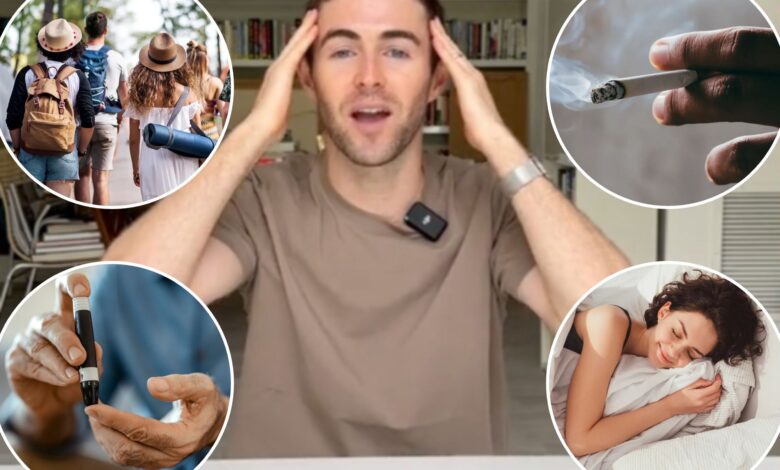Doctor reveals 9 simple ways to reduce your risk of dementia

After his grandmother died of complications related to dementia, Dr. Jake Goodman vowed to learn everything he could about the debilitating condition.
“Dementia sucks,” Goodman, a psychiatry resident physician in Miami, declared in a TikTok last month. “Now that I’m in my final year of psychiatry training, I have treated countless people with dementia — from Alzheimer’s to vascular to more rare types like Lewy body dementia — and I spent countless hours studying and learning things that we can do now to prevent our risk of developing dementia as we age.”
Nearly 7 million Americans have been diagnosed with dementia — Alzheimer’s disease is the most common form of the syndrome.
Goodman has devised a nine-pronged strategy to lowering dementia risk — consistent exercise, skill acquisition, social activity, healthy eating, no tobacco, less alcohol, diabetes management, good sleep and head protection.
Exercise regularly
“This one is key — consistent exercise has been shown to significantly reduce your chance of developing dementia, and what we’ve learned is that it doesn’t need to be some huge marathon training or CrossFit workout,” Goodman said. “Walking, jogging, swimming, biking, strength training, yoga, sports — you just have to get your body moving.”
According to the Physical Activity Guidelines for Americans, adults should aim for 150 minutes of moderate-intensity physical activity and two days of muscle strengthening a week.
Even household chores can lower dementia risk, especially for people who do not exercise often.
Learn new skills
“When you learn something new, you form new connections in your brain, and this builds resilience over time and protects you against dementia,” Goodman explained.
“It can be anything like gardening, brushing your teeth with your left hand, learning how to freestyle rap,” he added.
Socialize with others
“Social interactions stimulate mental activity and emotional well-being, which supports brain health,” Goodman shared.
On the flip side, social isolation has been associated with a 50% increased risk of dementia — it also raises the likelihood of heart disease and stroke.
Eat healthy foods
“A balanced diet like the Mediterranean diet, which consists of fruit, veggies, legumes, nuts, whole grains, fish, olive oil — while avoiding ultra-processed foods — provides essential nutrients for brain function,” Goodman said.
A 2023 study found that following the Mediterranean diet can lower the risk of dementia by up to 23%.
Avoid smoking
“Smoking has been shown to reduce blood flow to the brain, which can cause brain cell damage,” Goodman noted.
One scientific review determined that smokers are 30% more likely to develop dementia and 40% more likely to develop Alzheimer’s disease.
Limit alcohol
Consuming at least 14 alcoholic drinks a week has been linked to a higher dementia risk, according to a 2020 study.
“Throughout my training, I have seen brain scans of people that are in their 50s or 60s. Because of excess alcohol use over many years, their brains look a lot like brains of 90- or 100-year-olds,” Goodman said.
“You actually can see the brain shrink over time because the alcohol actually damages brain cells,” Goodman continued. “I’m not saying never drink alcohol at all, but if you do drink, it should be in moderation, not in excess.”
Manage diabetes and hypertension
Having Type 2 diabetes increases your dementia odds — the risk goes up if you have a severe case and if you have had diabetes for a long time.
“Properly managing diabetes can prevent brain cell damage from high blood sugar,” Goodman said.
High blood pressure — especially untreated hypertension — also raises your dementia risk.
“High blood pressure can damage arteries that send blood to the brain, which significantly affects brain health,” Goodman reported.
Get good sleep
Experts recommend adults get seven to nine hours of slumber a night. Poor sleep has been linked to obesity, diabetes, increased stress and other serious health conditions.
“When you get adequate sleep, you’re able to actually remove toxins that build up in your brain, and getting good sleep supports memory and learning,” Goodman said.
Wear head protection
Goodman suggests cyclists, snowboarders, athletes and other people at risk of hurting their heads wear helmets.
“Preventing your head from injuries prevents brain cells from being damaged,” he advised.




